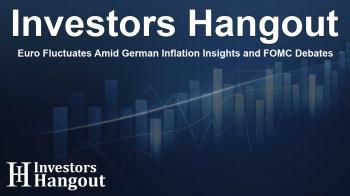Euro Fluctuates Amid German Inflation Insights and FOMC Debates

Euro's Quiet Week and Market Reactions
The euro has had a notably quiet week, drifting for three days without significant fluctuations. As of now, EUR/USD is trading at 1.1730, reflecting a minor increase of 0.09% on the day. This steadiness may signal a period of consolidation as traders assess the broader economic signals.
German Inflation Stands at 2% Amid Price Adjustments
Recent data reveals that German inflation has settled at 2.0% year-on-year for June, aligning with market expectations while showing a modest decline from the 2.1% reported in previous months. This slip in CPI is largely attributed to reduced energy and food prices, a positive sign for consumers. However, prices in the service sector continue to climb, indicating persistent underlying inflationary pressures.
This current inflation rate of 2.0% represents the lowest point since late 2024, safely positioned at the European Central Bank's (ECB) target. Yet, ECB policymakers are acutely aware that the challenge to manage inflation remains ongoing, as elevated service costs create complications in the overall economic landscape.
Furthermore, the appreciation of the euro, which has surged approximately 14% against the US dollar this year, poses a dual-edged sword for policymakers. On one hand, the stronger euro helps to restrain import costs, dampening inflationary tendencies. On the flip side, if this trend continues, it could potentially undermine the export sector, which relies heavily on price competitiveness in global markets.
In response to these evolving economic conditions, the ECB made the decision to lower its deposit rate in June, bringing it down to 2.0%, marking the lowest rate recorded since the end of 2022. Should the upcoming eurozone inflation report point to further declines, there may be rising expectations for an additional rate cut during the anticipated meeting on July 24.
Insights from the FOMC Minutes
The minutes from the most recent Federal Open Market Committee (FOMC) meeting yield a cautiously optimistic tone, revealing that there is a general consensus among members regarding the likelihood of implementing further rate cuts this year. However, opinions vary on the timing of such decisions, reflecting a divergence in economic outlooks. Some policymakers are advocating for cuts as early as the July meeting, while others are exercising caution, preferring to wait for clearer signals regarding inflation trends and employment data.
The impact of President Trump’s tariffs has thus far failed to propel inflation upward; however, the potential long-term inflationary effects of these tariffs could emerge in subsequent months, adding another layer of complexity to the Federal Reserve’s considerations.
Technical Analysis of EUR/USD
Current Market Conditions
In technical terms, EUR/USD has successfully breached the resistance level at 1.1721 and is currently testing the next resistance at 1.1733. Should the euro maintain this momentum, traders are eyeing 1.1739 for further key resistance. On the downside, support levels are projected at 1.1715 and 1.1703, providing potential safety nets for this currency pair.
Frequently Asked Questions
What does the current German inflation rate imply?
The current inflation rate of 2% indicates stable price increases, primarily affected by declining food and energy costs, but ongoing issues in the service sector persist.
How has the euro performed recently?
The euro has experienced a period of stability, currently trading around 1.1730 against the US dollar, showing minor gains.
What is the ECB's stance on rates?
The ECB has lowered rates to 2.0% as part of its strategy to manage inflation and will closely monitor upcoming inflation reports for potential further cuts.
Why are FOMC members divided on rate cuts?
Members express differing views based on their economic outlook, with some advocating for immediate cuts, while others prefer a cautious approach pending further economic data.
What influence do tariffs have on inflation?
While tariffs have not yet led to a spike in inflation, they hold the potential to affect prices in the future, making them a crucial factor for policymakers to consider.
About The Author
Contact Henry Turner privately here. Or send an email with ATTN: Henry Turner as the subject to contact@investorshangout.com.
About Investors Hangout
Investors Hangout is a leading online stock forum for financial discussion and learning, offering a wide range of free tools and resources. It draws in traders of all levels, who exchange market knowledge, investigate trading tactics, and keep an eye on industry developments in real time. Featuring financial articles, stock message boards, quotes, charts, company profiles, and live news updates. Through cooperative learning and a wealth of informational resources, it helps users from novices creating their first portfolios to experts honing their techniques. Join Investors Hangout today: https://investorshangout.com/
The content of this article is based on factual, publicly available information and does not represent legal, financial, or investment advice. Investors Hangout does not offer financial advice, and the author is not a licensed financial advisor. Consult a qualified advisor before making any financial or investment decisions based on this article. This article should not be considered advice to purchase, sell, or hold any securities or other investments. If any of the material provided here is inaccurate, please contact us for corrections.

